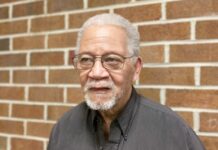
At 10:25 on a clear, brisk, but warming Monday morning in early March, Dream Verse and Al, separated by more than 30 lengths, jog eagerly under their exercise riders around the 1/6th-mile sheltered ring at Atlanta Hall horse farm in Monkton. Standing in an opening on the perimeter of the enclosure, Elizabeth Voss, the two steeplechasers’ trainer, nods approvingly, noting, “They’re feeling frisky after having yesterday off.”
Dressed in smartish work clothes—corduroys, stylish green coat, cashmere knit hat and brown knee-high boots—Voss has been overseeing the exercising of approximately 30 thoroughbreds since 6:30. Satisfied with the way that Dream Verse and Al break into a gallop to complete their half-mile routine, Voss hops into her nearby SUV and drives the short distance to the farm’s courtyard main barn, where the next pair to exercise—Renown and Mr. Singh, both stakes winners (the highest competitive level)—are saddled up.
All nonstop business as usual for Voss, 36, who, aided by her husband, Irish-born Garrett “Gary” Murray, has been supervising an increasingly successful thoroughbred racing operation—steeplechasers and turf (grass) runners—since 2014. For example, last year Renown won stakes races on the turf at Laurel Park in Maryland, Keeneland in Kentucky and Delaware Park, while Portrade won a high-grade steeplechase at Saratoga in New York. And another accomplished jumper, Imperial Way, lost the Maryland Hunt Cup by an eyelash in 2014, then returned to cross the finish line first in the next year’s Hunt Cup, only to be disqualified on an equipment-related technicality—essentially, an equine ward-robe malfunction.
“He’s basically won it twice without actually winning,” Voss says, adding that she plans to send out Imperial Way, along with Wildcatter, in this spring’s Hunt Cup, contested at a grueling four miles over 22 fences.
To the manner—and, in a sense, the manor—born, Voss grew up riding and caring for horses on 300-acre Atlanta Hall, an existing horse farm purchased by her great-grandparents in the late 1930s. Her father, Tom, expanded the operation, adding an all-weather track, among other improvements, while cutting a wide swath as a trainer of numerous stakes winners over the jumps and on the turf, including victories in the 1998 and 1999 Maryland Hunt Cup. Elizabeth took over his stable three years ago when Tom died suddenly at 63 of an apparent heart attack. She and Murray had been working as assistant trainers for Tom, living on the farm with their two young children, Genevieve (now 6) and Thomas (now 3), along with her parents.
“I always thought it was something [my father] could do for a very long time,” Voss recalls, standing in the kitchen of the farm’s main house, several dogs sprawled hither and yon, and two parakeets tweeting in the background. “But that next day, we got up, after him dying, and you’ve still got a barnful of horses and you’ve got to keep going. And I was happy to do it.”
Voss seemed destined for the task. She graduated from Garrison Forest and then attended college in Switzerland for a year before returning to study at the College of Charleston. She started out there as a pre-med student, but then earned a degree in U.S. history when she decided that she “wanted to do the horse thing.” That meant eight years working for Three Chimneys Farm, a major horse breeding and sales company based near Lexington, Kentucky—ground zero for the national thoroughbred industry. Voss began as an intern, ultimately rising to director of sales.
While with Three Chimneys, she met Murray, now 39—employed in various capacities for several other Lexington-based thoroughbred firms—when both worked the annual summer yearling sales at Saratoga. They married in 2010 after moving back to Maryland and then began assisting Tom.
These days, approximately 10 people—exercise riders, grooms, landscapers—maintain the farm and care for the 50 or so horses on the grounds, including 30 in training (20 jumpers, 10 on the flat) plus a mix of broodmares, yearlings, retirees and foxhunters. Like her father, Voss almost exclusively trains steeplechase and turf runners—the European style—eschewing races on the dirt, which make up the bulk of the American sport.
“It’s not that we choose to not race on the dirt,” Voss says. “If we had a young horse, we might start them out on the dirt. But jumpers, obviously, go on the turf.”
“Generally, we buy grass horses, we breed grass horses, our owners want grass horses,” Murray adds in his genial brogue, “so that’s what we target.” And although the couple does not mention it, dirt racing, by and large, results in considerably more wear and tear on racehorses, who fare better, health-wise, on grass.
That fact ties in to their decision to operate entirely from Atlanta Hall (with the exception of seven weeks spent at Saratoga Race Course each summer), vanning a specific horse to a specific track on race day and then returning to the farm immediately afterward. Most trainers stable and condition their horses full-time on a racetrack’s more confining premises. The farm’s all-weather track, indoor dirt ring and huge areas to gallop on the turf, plus its location—readily accessible to a host of mid-Atlantic and Northeastern racetracks—afford Voss that luxury. “I think it’s much better for the horses,” she says. “They can do different things here, like gallop cross-country, instead of doing the same thing every day at the track.”
Her horses also benefit from the fact that they vacation, in effect, from mid-November, when steeplechase season concludes and turf racing ceases (outside of warm climes) until the end of March, when jump racing—and, to a lesser extent, grass racing—resume. “It’s nice for the horses to have a little break,” she says, “get rejuvenated and turned out [in a field] for a couple of hours a day.”
 While Voss and Murray own one of their trainees outright and control an interest in a few others with partners, most are owned by outside clients, many based in Maryland. And each fall the couple travels to England to buy racing-age horses for some of those clients at an annual sale, during which Murray assumes a prominent advice-and-consent role (Renown and Mr. Singh were purchased there).
While Voss and Murray own one of their trainees outright and control an interest in a few others with partners, most are owned by outside clients, many based in Maryland. And each fall the couple travels to England to buy racing-age horses for some of those clients at an annual sale, during which Murray assumes a prominent advice-and-consent role (Renown and Mr. Singh were purchased there).
Also like her father, Voss serves as joint master of the Elkridge-Harford Hunt Club—its clubhouse sits just across Jarrettsville Pike from Atlanta Hall—riding to the hounds, as the phrase goes, three days a week from September through March. The group roams area farms, including Atlanta Hall; sometimes the dogs scare up a fox, sometimes they don’t. Voss has foxhunted since she was a girl: “It really goes hand in hand with conservation of this area. A lot of the people who foxhunt put their farms into easement to protect the land from development.”
The hunt club affiliation extends to the point-to-point races held at Atlanta Hall each spring, an event that kicks off Maryland’s timber racing season—four consecutive Saturdays of steeplechases over wooden fences that culminates with the Maryland Hunt Cup.
“It’s really 24/7,” notes Voss of the farm. “It’s a great job to wake up, work outside, ride horses. I just love being out with them every morning. But horses are animals: They get sick; they get hurt; it can be stressful. I couldn’t do it on my own and have Gary doing something else. It’s wonderful that he’s here, so that I can have a morning with the kids [while Gary tends to the horses.] And this is just such a great place for the kids to grow up. I’m really lucky that we have this great set-up that started with my great-grandparents and continued with my father.
“Of course,” she adds after a pause, “it would be nice to finally win the Maryland Hunt Cup. I mean really win it.”





